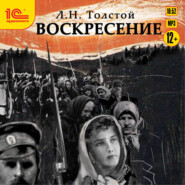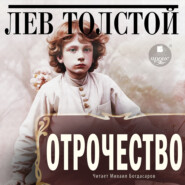По всем вопросам обращайтесь на: info@litportal.ru
(©) 2003-2024.
✖
A Russian Proprietor, and Other Stories
Настройки чтения
Размер шрифта
Высота строк
Поля
Turbin arose from the sofa, and asked the Greek to give him his place next the banker. The Greek changed places; and the count, taking his chair, and not moving his eyes, began to watch Lukhnof's hands attentively.
"Ilyin," said he suddenly in his ordinary voice, which, entirely contrary to his desire, drowned out the others, "why do you stick to those routine cards? You don't know how to play!"
"Supposing I don't, it's all the same."
"You'll lose that way surely. Let me play against the bank for you."
"No, excuse me, I beg of you. I'm always this way. Play for yourself if you like."
"I have told you that I am not going to play. But I should like to play for you. I hate to see you losing so."
"Ah, well! you see it's my luck."
The count said nothing more, and leaning on his elbow began once more to watch the banker's hand just as attentively as before.
"Shameful!" he suddenly cried in a loud voice, dwelling on the word.
Lukhnof glared at him.
"Shameful, shameful!" he repeated still louder, staring straight into Lukhnof's eyes.
The game continued.
"That is not right!" said Turbin again, as Lukhnof trumped one of Ilyin's high cards.
"What displeases you, count?" politely asked the banker with an air of indifference.
"Because you give Ilyin a simplum, and turn down your corners. That's what is shameful!"
Lukhnof made a slight motion with his shoulders and brows, signifying that he was resigned to any fate, and then he went on with the game.
"Blücher, fiu!" cried the count, rising; "over with him!" he added quickly. Blücher, bumping against the sofa with his back, and almost knocking the garrison officer from his feet, came leaping toward his master, looking at every one and wagging his tail as though he would ask, "Who is misbehaving here, hey?"
Lukhnof laid down the cards, and moved his chair away. "This is no way to play," said he. "I detest dogs. What kind of a game can you have if a whole pack of hounds is to be brought in?"
"Especially that kind of dog: they are called blood-suckers, if I am not mistaken," suggested the garrison officer.
"Well, are we to play or not, Mikháïlo Vasílyitch?" asked Lukhnof, addressing the uhlan.
"Don't bother us, count, I beg of you," said Ilyin, turning to Turbin.
"Come here for a moment," said Turbin, taking Ilyin's arm, and drawing him into the next room.
There the count's words were perfectly audible, though he spoke in his ordinary tone. But his voice was so powerful that it could always be heard three rooms off.
"Are you beside yourself? Don't you see that that man with the glasses is a cheat of the worst order?"
"Hey? Nonsense! Be careful what you say."
"No nonsense! but quit it, I tell you. It makes no difference to me. Another time I myself would have plucked you; but now I am sorry to see you ruining yourself. Have you any public money left?"
"No. What makes you think so about him?"
"Brother, I have been over this same road, and I know the ways of these professional gamblers. I tell you that the man in the glasses is a cheat. Quit, please. I ask you as a comrade."
"All right; I'll have just one more hand, and then have done with it."
"I know what that 'one more' means: very well, we will see."
They returned to the gaming-table. In one deal he laid down so many cards, and they were trumped so badly, that he lost a large amount.
Turbin rested his hand in the middle of the table, and said, "That's enough! now let us be going."
"No, I can't go yet; leave me, please," said Ilyin in vexation, shuffling the bent cards and not looking at Turbin.
"All right! the Devil be with you! Lose all you've got, if that please you; but it's time for me to be going. – Come, Zavalshevsky, let us go to the marshal's."
And they went out. No one spoke, and Lukhnof did not make the bank until the noise of their feet and of Blücher's paws had died away down the corridor.
"That's a madcap," said the proprietor, smiling.
"Well, now he won't bother us any more," said the garrison officer in a hurried whisper.
And the game went on.
IV
The band, composed of the marshal's domestic serfs, were stationed in the butler's pantry, which had been put in order on account of the ball, and, having turned up the sleeves of their coats, had begun at the signal of their leader to play the ancient polonaise "Aleksandr, Yelisaviéta;" and under the soft, brilliant light of the wax candles, the couples began to move in tripping measure through the great ballroom; a governor-general of Catherine's time, with a star, taking out the gaunt wife of the marshal, the marshal with the governor's wife, and so on through all the hierarchy of the government in various combinations and variations, – when Zavalshevsky in a blue coat with a huge collar, and epaulets on his shoulders, and wearing stockings and pumps, and exhaling about him an odor of jasmine with which he had plentifully drenched his mustaches, the facings of his coat, and his handkerchief, entered with the handsome count, who wore tight-fitting blue trousers and a red pelisse embroidered with gold, and wearing on his breast the cross of Vladímir and a medal of 1812.
The count was of medium height, but had an extremely handsome figure. His clear blue eyes of remarkable brilliancy, and dark hair which was rather long and fell in thick ringlets, gave his beauty a peculiar character.
The count's presence at the ball was not unexpected. The handsome young man who had seen him at the hotel had already spoken of him to the marshal.
The impressions made by this announcement were of various kinds, but on the whole were not altogether pleasant.
"I suppose this young man will turn us into ridicule," was what the old women and the men said to themselves.
"Suppose he should run off with me," was what the wives and young ladies thought, with more or less apprehension.
As soon as the polonaise was finished, and the couples had made each other low bows, once more the women formed little groups by themselves, and the men by themselves. Zavalshevsky, proud and happy, led the count up to the hostess.
The marshal's wife, conscious of a certain inward trepidation lest this hussar should make her the cause of some scandal before everybody, said proudly and scornfully, as she turned away, "Very glad to see you. I hope that you will dance." And then she looked at the count mistrustfully with an expression that seemed to say, "Now, if you insult any woman, then you are a perfect scoundrel after this."
The count, however, quickly overcame this prejudice by his amiability, his politeness, and his handsome jovial appearance; so that in five minutes the expression on the face of the marshal's wife plainly declared to all who stood around her, "I know how to manage all these men. He immediately realized whom he was talking with. And now he will be charming to me all the rest of the evening."
Moreover, just then the governor, who had known his father, came up to the count, and very graciously drew him to one side, and entered into conversation with him, which still more pleased the fashionable society of the town, and raised the count in their estimation.
Then Zavalshevsky presented the count to his sister, a plump young widow, who, ever since the count entered the room, had kept her big black eyes fastened upon him.

















